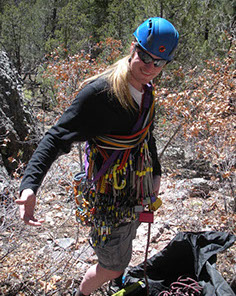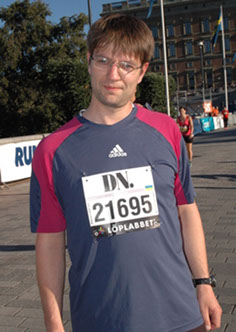Contributors¶
Ben Bergen¶

CCS-7 Applied Computer Science
Los Alamos National Laboratory
Ben is a computational scientist working on problems in space physics and weapons science. He is also interested in understanding and developing programming models and tools for modern computing architectures.
Ben is the current Co-Design Team and Project lead. He is also a deputy project lead for the Ristra Project, part of the Advanced Technology Development & Mitigation (ATDM) Program under the Department of Energy (DOE).
Christoph Junghans¶

CCS-7 Applied Computer Science
Los Alamos National Laboratory
Christoph is a computational physicist with a background in molecular dynamics and multi-scale physics applications. He also has experience in software engineering and task-based run-time systems. His interests lie in understanding modern computing architectures and the design of sustainable code.
David Daniel¶

CCS-7 Applied Computer Science
Los Alamos National Laboratory
David is a computational scientist with a broad background in parallel computing, and in physics research from QCD to cosmology. Currently, David is the computer science lead for LANL’s Ristra project that is developing a suite of next-generation multi-physics codes based on FleCSI targeting exascale-class computers and beyond.
Irina Demeshko¶

CCS-7 Applied Computer Science
Los Alamos National Laboratory
Irina is a computational scientist on the Co-Design Team. Her research interests are focused on new HPC technologies in application and large-scale scientific simulation codes. Her current work is directed at integrating task-based runtime systems into several software projects at LANL, including the FleCSI and CANGA projects.
Jonas Lippuner¶

CCS-2 Computational Physics & Methods
Los Alamos National Laboratory
Jonas is a computational scientist with a background in computational and nuclear astrophysics. His research has been focused on the origin of heavy elements like silver, gold, and uranium. He has developed a sophisticated nuclear reaction network to simulate how such elements and thousands of other isotopes are created in various astrophysical scenarios, such as the merger of two neutron stars or the explosion of a massive star. Jonas also has extensive experience with developing highly optimized code for GPUs. He is working on implementing physics applications on top of the FleCSI framework.
Jonathan Graham¶

CCS-7 Applied Computer Science
Los Alamos National Laboratory
Jonathan has a multidisciplinary background in observational solar physics, turbulence theory, astrophysical simulation, the oil and gas industry, and programming models for exascale computing. He has published papers evaluating mesoscale ocean large-eddy simulation models by employing spectral transfer analysis, determining the limits of fractal extrapolation of the mean solar magnetic flux, investigating the small scale dynamo in convective, radiative magnetohydrodynamics, and several papers on using mathematical closures for large eddy simulations.
Jonathan has been involved in using Legion task-based parallelism for exascale computing both in proxy applications and in the development of FleCSI.
Nick Moss¶

Data Science Team
Medable
Nick is a computer scientist and former member of the CCS-7 programming models team with expertise in programming systems and domain-specific languages, compiler design, LLVM, C++ internals and Clang, parallel, concurrent, and task-based programming models, and distributed data systems.
Nick is one of the primary designers of FLeCSI, having designed and implemented various parts of its infrastructure including: mesh and tree topology, data model, distributed task execution, and more recently has worked on the Kitsune project to produce a specialized FleCSI compiler.
Oleg Korobkin¶

CCS-7 Applied Computer Science
Los Alamos National Laboratory
Oleg is a computational physicist with a background in numerical relativity and relativistic astrophysics, with a particular focus on physics of neutron stars and accretion disks around black holes. He also has experience in simulating nucleosynthesis of heavy elements by solving complex nuclear reaction networks. He is interested in the inner workings of gamma-ray bursts, specifically in modeling violent relativistic hydrodynamics of neutron star mergers and investigating a variety of potentially observable signals.
Li-Ta (Ollie) Lo¶

CCS-7 Applied Computer Science
Los Alamos National Laboratory
Li-Ta Lo is currently a computer scientist with the Data Science at Scale team of Los Alamos National Laboratory. His research interests include data science, large-scale visualization and analysis, data-parallel programming and software engineering for scientific computing. His work for FleCSI focuses on providing an efficient and scalable MPI backend.
Karen Tsai¶

CCS-7 Applied Computer Science
Los Alamos National Laboratory
Karen is a computer and computational scientist who is interested in understanding, designing, and developing application code with scientists. She is also interested in learning about and utilizing modern computing tools to optimize algorithms and visualize complex datasets. She has a Master of Science in Computational Science, Engineering and Mathematics and a Bachelor of Science in Computer Science from the University of Texas – Austin. Karen joined the Co-Design Team in the fall of 2017 to work on the Ristra and FleCSI projects.
Wei Wu¶

CCS-7 Applied Computer Science
Los Alamos National Laboratory
Wei is a computer scientist whose research is focused on runtime systems and programing models for heterogeneous systems. He has worked on a variety of task-based runtime systems, such as Legion and PaRSEC. He was also a member of the Open MPI team, developing CUDA-aware capability for Open MPI. Wei received his Ph.D. in Computer Science from the University of Tennessee at Knoxville, and joined the Programming Models team in 2017.